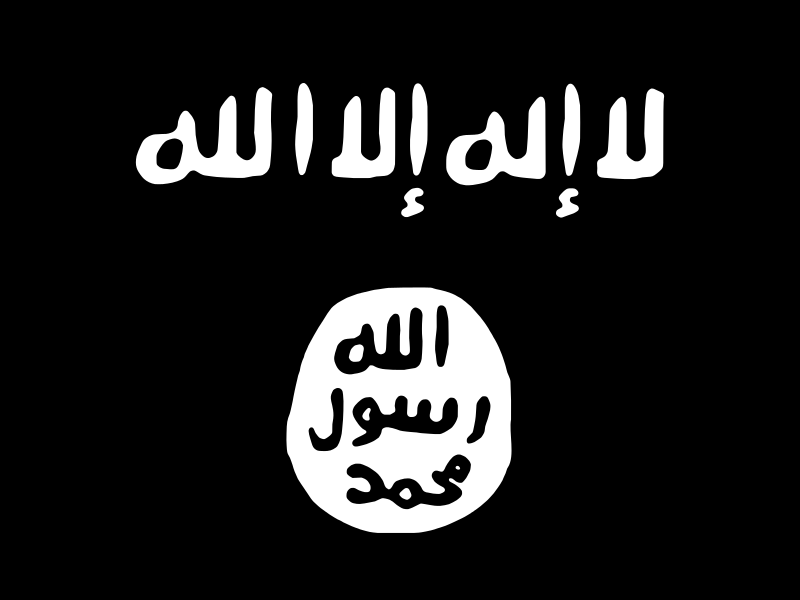A Death Trap of Wishful Thinking
Black flag of ISIS Image Credit: Wikimedia Commons
ISIS (the Islamic State of Iraq and Sham) has just reminded us in Paris that they are at war with Modern Civilization. Those they seek to kill belong not just to that part of Western Civilization called the United States of America. They seek the death of anyone anywhere who does not adhere to the Sharia law of seventh century Arabia and who does not worship Allah according to their Sunni precepts. In fact, because they have much greater access to other Muslims, they have by all accounts killed a great many more of their fellow Muslims than members of Western or Oriental Civilization. Horrifyingly, ISIS does not hesitate to kill women, or even children. If you have the stomach for it, consider the photographs in the Catholic Online post WARNING GRAPHIC PHOTOS (RAW) – ISIS begins killing Christians in Mosul, CHILDREN BEHEADED. One can not but weep on seeing them.
Definition of the Problem
It does not matter if some members of Western Civilization think they are not really at war with any portion of Islam. That fraction of Islam that is ISIS certainly is at war with them – and with all the rest of us as well. No amount of wishful thinking can remove us from ISIS’ crosshairs. Why is it that just by our mere existence we find ourselves in an existential war with Islamic jihadis?
I have addressed this question once before in the post How Should We Think About ISIS?, in which I concluded
What is most important to understand is that even if we do not think that ISIS is an authentic, modern day example of Islam, they think that they are the only true followers of Allah in the world today. Being directly under the orders of God, they will do anything in the service of God’s Caliphate. If we do not consider this is a religious war, they most certainly do. And if history teaches us anything (see here and here and here), it is that religious wars last a very, very long time.
Bernard Lewis, one of the most highly regarded experts on Islam and the Middle East and a Professor Emeritus of Near Eastern Studies at Princeton University, has written a great deal about the historical, social, and religious forces that have given rise to ISIS. Lewis paints a picture of a civilization that has always been suspicious and apprehensive of the West (with more than a little historical justification), and are especially apprehensive of any modernization based on Western ideas. (References [H3], [H4], and [H6]). These apprehensions are enhanced by the embarrassment that they, the holders of the one true belief in Allah, are dominated by the intellectual and economic success of the West. Should not they, the faithful of Allah, be the ones to dominate? One gains the impression the radical jihadis will never forgive us for this embarrassment. They would rather kill us first.
Obama’s Wishful Thinking
President Obama’s reaction to the Paris attack is consistent with his other statements and actions concerning ISIS: He said as little as possible (not even acknowledging the connection with ISIS) and promised only
We stand prepared and ready to provide whatever assistance that the government and the people of France need to respond. … And we want to be very clear that we stand together with them in the fight against terrorism and extremism. … We’re going to do whatever it takes to work with the French people and with nations around the world to bring these terrorists to justice, and to go after any terrorist networks that go after our people.
These are all fine, brave words, but so far he has not promised any escalation of military strikes on ISIS. If he follows his usual mode of operation, he will continue to do the bare minimum possible to avoid wide-spread public condemnation.
The news magazine U.S. News and World Report had an interesting reaction to Obama’s remark that the attack was “on all of humanity and the universal values that we share.” To this the USNWR editorialist Christopher Hull replied “But he’s flat, dead wrong. All of humanity does not share Western values, or the Paris attack wouldn’t have happened.” And as Hull later notes, the President repeatedly has refused to say the Islamic jihadis do not share Western values.
Obama’s past actions and statements [see A Failed, “Lead from Behind” Foreign Policy (1)] lead me to believe that he blames the U.S. for much of the world’s problems. He apparently intends to steer the U.S. into a more isolationist position, both to minimize what he he views as the baleful effect the U.S. has on world affairs, as well as to release national security spending for domestic use. He has a little more than a year left to accomplish this goal.
Some of the fall out from Obama’s isolationist predilections are discussed in A Failed, “Lead from Behind” Foreign Policy (2) as well as in Consequences of a Weak US President. To follow his policies he must believe that organizations like ISIS and al-Qaeda, and countries like Russia, Iran, and China do not present any real threat to the United States. Believing this, he must think he creates no real threat to the U.S. by ignoring these problems as much as possible and kicking the can down the road to the next President. Such an awesome, breath-taking case of wishful thinking can get a lot of Americans killed. Obama’s wishful thinking is a true death trap.
The Problem of Ideology
Some have focused on the notion we can not defeat ISIS and similar jihadis by simply killing them. If we merely kill some of them, their ideas about their relations and duty to Allah have not been killed. If their ideas are not defeated, then they can spread again like an ebola virus to infect other Muslims. Some, such as State Department spokeswoman Marie Harf, say that we cannot win this war by killing ISIS, but we must create some kind of international welfare program that gives jobs to those in ISIS, and that would serve us better. I have even heard some extrapolate from this thought that we should in no way engage ISIS in combat, but replace military hostilities with some kind of propaganda war and international aid program instead.
Yet, there is a great deal of merit to the thought we must kill Islamic jihadist ideas. In the end ideas are the most powerful motivators for mass human action. In the end we must convince all of the muslim world that tolerance for others and mutual respect for the rights of other cultures will gain them a lot more than a perpetual war with the rest of humanity. Yet, while we attempt to persuade all of the muslim world about this proposition, we can not ignore the continuing need to kill members of ISIS and al-Qaeda as much as we can until we achieve such a universal peace. Otherwise we might not live long enough to see the universal peace.
The Problems of Survival and War-Weariness
The United States has been at war with Islamic Jihadis for at least 14 years, if you count the start as that eleventh day of September, 2001. Over that long period of time, many Americans have naturally become weary of hearing about a conflict that we seemed powerless to end, and which cost so much in blood and treasure. Some have questioned whether ISIS would have arisen at all if we had not invaded Iraq.

Photo Credit: Official USMC Photo
Those who question should consider these inconvenient truths. Al-Qaeda’s attacks on 9/11/2001 preceded the invasion of Iraq in March 2003 by about one-and-a-half years. The first attack on the New York World Trade Towers on February 26, 1993 preceded the invasion by about eight years. Then there were all the air hijackings by islamic extremists in the 1980s and 1990s (see here and here and here). And of course the bombing of the Marine barracks in Beirut on October 23, 1983 by a group calling itself “Islamic Jihad” preceded the invasion by about a decade. Radical Islamists have had a bulls-eye painted on Western Civilization for a lot longer than the start of the Iraq invasion by the U.S. If the United States had not invaded Iraq, the rise of ISIS almost certainly would have occurred much differently and at a different time (without the American resistance, probably earlier), but the clash of cultures made it absolutely certain that ISIS would be born one way or another, and would be seeking the death of Western Civilization.
It is very easy to understand the war weariness of Americans. War is an activity very easy to nauseate a person within, say, the very first second that person is exposed to it. I can speak from bitter experience; very little can be more miserable. Yet, if our civilization is to survive, and if we do not want human institutions and relationships to regress to their state circa 700 AD, then we had damn well better get our stuff together and kill as many jihadis as we can.
Views: 2,340






























